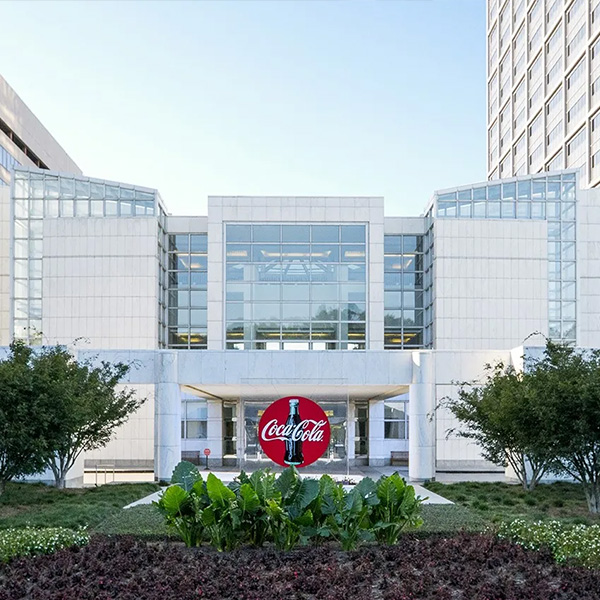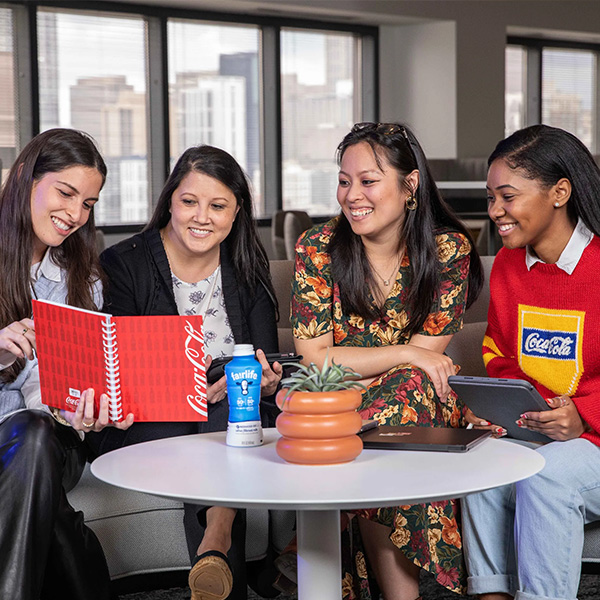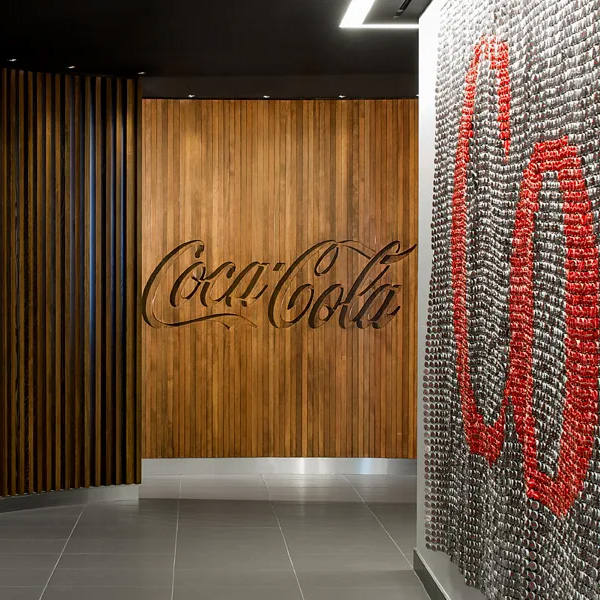California Transparency in Supply Chain Act
07/11/2017
Respect for human rights is fundamental to the sustainability of The Coca‑Cola Company and its subsidiaries and the Company is committed to working to ensure that people associated with the businesses and connected to the supply chains are treated with dignity and respect. The International Labor Organization estimates that 21 million people are in forced labor situations, over half of whom are in industries that may feed into global supply chains. This is one of the critical human rights issues of the current era and all companies must make it clear that there is no place for such practices in modern business operations. The Coca‑Cola Company’s Human Rights Policy and Supplier Guiding Principles prohibit the use of all forms of forced labor, including prison labor, indentured labor, bonded labor, military labor, slave labor and any form of human trafficking.
As part of recent efforts, the Company implemented policy enhancements and undertook work to identify risks deeper in the supply chain, collaborated with peer companies to support an industry-wide resolution against forced labor, conducted supplier trainings focused on the topic and became a founding member of a multi-stakeholder initiative to advocate for the “employer pays principle.” Through these steps, the Company aims to improve due diligence in the own supply chain and raise awareness through collaboration.
Verification: Policies and Contractual Controls
The Company’s Human Rights Policy applies to Company-owned and controlled operations worldwide and clearly articulates its corporate commitment to respect human rights in its operations. Together the Human Rights Policy and Supplier Guiding Principles establish a foundation for requiring the business around the world to be maintained in accordance with Company standards, including prohibiting the use of forced labor and human trafficking. These policies also include rights that provide an important underpinning against forced labor, including freedom of association, child labor, abuse of labor and grievance mechanisms.
The Supplier Guiding Principles are embedded into contractual agreements and purchase orders between the Company and direct and authorized suppliers. TCCC expects partners and suppliers to develop and implement appropriate internal business processes to ensure compliance with the Supplier Guiding Principles.
Recognizing that migrant workers are particularly vulnerable to exploitation and human trafficking, in 2014, the Company reviewed policies and due diligence activities with the aim of better protecting such workers throughout the supply chain. The Company publicly committed to three principles related to the recruitment and employment of migrant workers:
- Employment terms are represented in a truthful, clear manner and in the language understood by workers prior to employment;
- Worker does not pay recruitment, placement or transportation fees; and
- Worker has access to personal identity documents.
These principles, along with the overall prohibition of forced labor, create a framework for responsible and transparent recruitment and employment practices. These practices were built into the Company’s audit protocol at the beginning of 2015 and conducted auditor training sessions around the world to familiarize third-party auditors with the new expectations. The Company continues to do refresh auditor training as needed.
To further promote the “Employer Pays Principle,” The Coca‑Cola Company is a founding member of the leadership Group for Responsible Recruitment, a group of companies that have committed to the principle. No worker should pay for a job - the costs of recruitment should be borne not by the worker but by the employer. The Leadership Group, supported by the Institute for Human Rights and Business (IHRB), the Interfaith Center on Corporate Responsibility (ICCR), International Organization for Migration (IOM) and Verite, will be championing the idea among peer companies.
One potential area of risk for forced labor and human trafficking is agriculture. The Company and local subsidiaries do not typically purchase agricultural ingredients directly from farms, nor does the Company own farms or plantations. But, as a major buyer of agricultural ingredients, such as sugar, the Company strives to ensure human rights are respected across these ingredient supply chains. In 2013, the Company has made a commitment to sustainably source 100% of priority agricultural ingredients, which range from sugarcane to tea to citrus fruits by 2020. To this end, in 2013 the Sustainable Agriculture Guiding Principles (“SAGP”) was published. The SAGP, which builds on the Company’s Supplier Guiding Principles, prohibits forced labor and human trafficking.
Supplier Audits and Certification:
As part of the contractual language, direct and authorized suppliers agree to comply with the Supplier Guiding Principles. In addition, all the bottling operations and authorized suppliers selling more than $60,000 annually to the Coca‑Cola system are required to complete a third-party audit and share the audit results with The Coca‑Cola Company. Moreover, the Company has chosen not to limit the audits to those suppliers identified on a risk-based approach –for instance only auditing in certain markets or certain product lines –because, as a global brand, Company standards and expectations are global as well. And, because The Coca‑Cola Company believes that it is important to demonstrate that it holds itself to the same requirements that is asked of supplier partners, third-party audits are also conducted at Company office locations. Given the contractual language and audit requirements, the Company does not devote resources to requesting that suppliers certify that they comply with the trafficking laws of the countries in which they do business.
Third-party audits remain an important tool for confirming adherence to the Human Rights Policy and Supplier Guiding Principles, including any evidence of any forced labor or human trafficking. The Company approves a select number of independent audit firms and work with them to conduct the audits which generally span one to three-person days depending on facility worker population. The audits are generally announced, but the Company reserves the right to conduct unannounced audits as well. The primary components of an audit include an opening meeting to familiarize the facility management with the process and expectations and to answer any questions. A facility walkthrough enables the auditors to review safe workplace conditions including emergency exits, chemical storage, machine safety, etc. Confidential interviews which sample both employees and contingent workers enable auditors to hear directly from workers. Management is not allowed to be present during workers interviews and while guidance is provided to auditors on topics to cover, the intention is for the auditor to have a conversation and make workers feel comfortable. Record reviews enable the auditors to cross-check the information gathered throughout the assessment against personnel files, wage records and hours of work logs. At the completion of the audit, a closing meeting is held with management to review any findings identified and review recommended corrective actions. The facility manager is asked to sign a summary report. A full report is then be issued and sent to The Coca‑Cola Company and the facility, generally within two weeks.
If a supplier fails to uphold any aspect of the Supplier Guiding Principles requirements, it is expected to pursue remediation. The Company works with suppliers to implement corrective actions and demonstrate compliance through a follow-up assessment. Depending on the type of finding, corrective actions are expected to occur to remediate issues immediately for critical findings or within 30-90 days for those findings that require additional implementation time. Validation of remediation occurs through in-person or remote follow-ups. A remote follow-up would suffice when documents can be provided to show corrective action while in-person follow-ups are scheduled if interviews or visual inspection are needed. This process and associated expectations are explained to suppliers in detail in the Workplace Implementation Guide.
In areas where employment of foreign or migrant workers is common, auditors are asked to pay special attention to the recruitment process and document retention. Recruitment agencies can offer a valuable service but can also render workers vulnerable to bonded or forced labor. Migrant workers may become trapped by debt incurred to pay recruiters or by visa and work permit regulations that bind them to a particular workplace, and by limited access to host country law enforcement. In 2016, the Company invited the Interfaith Center on Corporate Responsibilityto shadow an auditor at a Taiwan supplier, where migrant workers are present. The intention was to validate the process implementation and solicit feedback. Audit firms are asked to take special care in identifying any higher risk recruitment practices, including verifying the employment terms were shared prior to employment and covered topics such as:
- Minimum and overtime wage rates;
- Maximum overtime hours that can be expected and that are consistent with local laws; Benefits to be provided;
- Summary of the living conditions if applicable;
- Any legalities regarding terminating employment or visas required for exiting the country.
Auditors inquire during interviews and review payroll records to identify instances where recruitment or placement fees were charged to workers.
Internal Accountability
The Company associate who owns the relationship with a supplier is expected to communicate responsible sourcing expectations and, if applicable, ensure an audit is conducted and compliance is achieved.SGP compliance is part of the supplier authorization process and progress is tracked and reported internally on a quarterly basis and reported externally on an annual basis. Each year, The Coca‑Cola Company facilitates more than 2,000 third-party audits of Company office locations, franchise bottlers, and suppliers each year and more than 20,000 third-party audits since the audit program began in 2003. The Company’s publicly stated goal is that, by 2020, 98 percent of bottling plants and 95 percent of in-scope suppliers will achieve compliance with the Supplier Guiding Principles. Based on the results of third-party audits, by the end of 2016, 90 percent overall achieved compliance with the Supplier Guiding Principles. The Company works with those sites that have not yet achieved compliance to remediate issues, make continuous improvement and then demonstrate progress during the next audit.
There is a Committee within The Coca‑Cola Company’s Board of Directors that reviews the Company’s human and workplace rights policies and how the Company demonstrates respect for human and workplace rights in the business system, in the supply chain and in the communities in which the Company operates. At a minimum, the Committee receives progress reports in this area annually.
Training and Industry Engagement
To support employees and suppliers in upholding the Human Rights Policy and Supplier Guiding Principles, the Company conduct training and provide online resources. Training on the Human Rights Policy has now been incorporated as a standard online training module for all employees, including special training for those responsible for supply chain management for the entities publishing this statement. Company employees are provided multiple internal mechanisms to report any violation of Company policy or law, including related to forced labor and human trafficking. The Company maintains a third-party service to allow employees and vendors to report violations in multiple languages via KOethics.com 24 hours a day. The Company has published online simple brochures available in 14 languages outlining what employees and leaders need to know and do regarding respect for human rights overall. To further bring the topic of human rights to life, a video was assembled with a compilation of employees talking about what human rights means to them as part of a blog post. The Human Rights Managers Guide, which specifically covers the topics of forced labor and human trafficking, is available online and helps Coca‑Cola managers globally, including managers of the disclosing entities, understand expectations including with regards to forced labor and human trafficking.
For suppliers, in-person training, as well as online resources, are provided. The Workplace Implementation Guide is available in multiple languages and outlines how to uphold the Supplier Guiding Principles. The Company also developed a mobile app which is available on iTunes and is intended for use by suppliers and employees and includes interactive checklists related to key risk areas such as forced labor among migrant workers.
To underscore the message against forced labor and human trafficking, the Company collaborates with peer companies through the industry group AIM-PROGRESS to deliver supplier trainings. AIM-PROGRESS is a forum of Fast Moving Consumer Goods (FMCG) manufacturers and common suppliers, assembled to enable and promote responsible sourcing practices and sustainable supply chains. By working together with peers, the Company strengthens the common message about workplace rights overall and the prohibition of forced labor and human trafficking across the industry. During recent supplier trainings in Thailand in 2016, AIM-PROGRESS included specific sessions on addressing human trafficking risks. The 2016 training in Thailand brought together 350+ representatives of suppliers in the sector in Thailand and included an afternoon workshop on managing migrant labor to reduce the risk of human trafficking. Additional sessions are planned in 2017 focusing specifically on reducing and addressing the risk of human trafficking.
The Consumer Goods Forum (CGF) is a consortium of consumer goods manufacturers and retailers focused on pursuing efficiency and positive change. In 2016, the CGF members decided to highlight the eradication of forced labor as a critical issue. The Coca‑Cola Company was one of the co-leads for a workstream focused on drafting and now implementing the CGF’s Forced Labor Resolution. An Action Framework for implementation of the Resolution was subsequently developed and then approved by the Board of CGF in June of 2016. The Forced Labor Resolution identified a set of Priority Industry Principles. The Priority Industry Principles, listed below, aim to address employment practices that can lead to forced labor situations:
- Every worker should have freedom of movement
- No worker should pay for a job
- No worker should be indebted or coerced to work
The workstream encourages members to take steps to implement and mainstream these principles in their own operations and supply chain and to find opportunities for collaboration with other CGF members. In 2017, the Company continues to work with other CGF member companies to disseminate and advocate for the vision articulated in the resolution including through joint training efforts addressed to suppliers.
Looking Ahead
The Company will continue to use its voice within the business community to advocate against forced labor and human trafficking in global supply chains. In particular, the Company will continue supporting the implementation of the Consumer Goods Forum Forced Labor Resolution, learning from experience to date and from stakeholder feedback to improve the recruitment risk monitoring program and testing new ways to scrutinize recruitment practices. When findings are identified the Company will continue to work with suppliers to ensure labor brokers utilized cease the practice of charging recruitment fees.
The Coca‑Cola Company is 131 years young, serving beverages that refresh the world. The Company strives to enable any consumer anywhere in the world to enjoy a moment of happiness from a beverage that has been made in line with the values and with respect for human rights.



